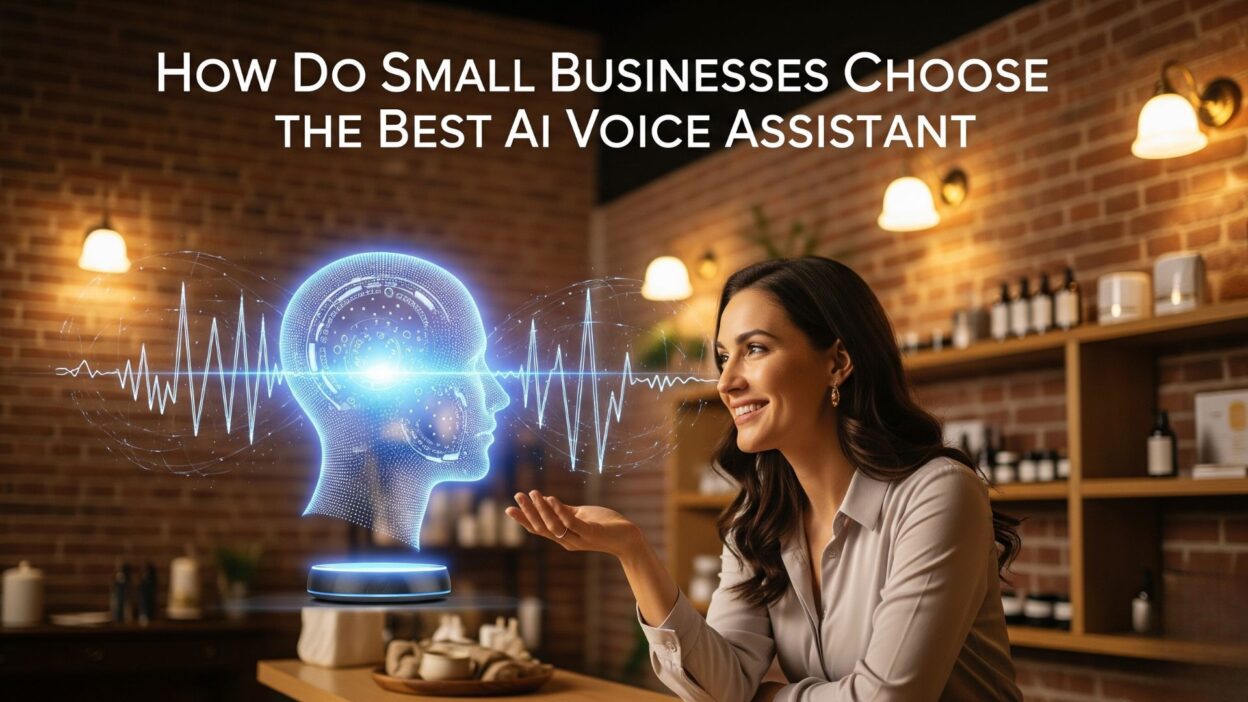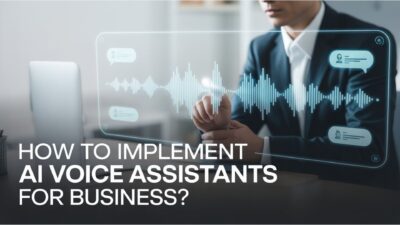Discover the ultimate guide for selecting the perfect AI voice assistant tailored to your small business needs, from understanding key capabilities to implementing cost-effective solutions that drive growth and enhance customer satisfaction.
Table of Contents
TL;DR Small businesses today face unprecedented challenges in maintaining competitive customer service while managing limited resources and tight budgets. Understanding how do small businesses choose the best AI voice assistant has become increasingly critical as artificial intelligence revolutionizes customer interactions. With the global AI assistant market projected to reach $15.7 billion by 2025, small and medium-sized enterprises can no longer afford to overlook this transformative technology.
This comprehensive guide explores proven strategies for selecting, customizing, and implementing AI voice assistants that align with your business objectives. By understanding how do small businesses choose the best AI voice assistant, you’ll discover solutions that enhance operational efficiency and deliver measurable ROI within 30 days.
Harnessing AI Powered Voice Assistants for Small Business Efficiency
When examining how do small businesses choose the best AI voice assistant, it’s essential to understand that AI-powered voice assistants have emerged as game-changing solutions for small businesses seeking to automate customer interactions, streamline operations, and scale their service capabilities without proportional increases in overhead costs. Unlike traditional phone systems that require constant human intervention, modern AI voice assistants leverage advanced natural language processing and machine learning to handle complex customer conversations with human-like precision.
Understanding AI Voice Assistants and Their Capabilities
Modern AI voice assistants represent a sophisticated fusion of cutting-edge technologies working in harmony to deliver seamless customer experiences. These intelligent systems utilize speech recognition algorithms that achieve 95%+ accuracy rates, natural language understanding engines that interpret context and intent, and response generation capabilities that provide contextually relevant solutions.
Key technological components include:
- Advanced Speech Recognition: Converting spoken audio into accurate text transcription with industry-leading precision
- Natural Language Understanding: Interpreting customer intent, emotional context, and complex queries across multiple languages
- Dialogue Management: Maintaining coherent, context-aware conversations that feel natural and engaging
- Integration Capabilities: Seamlessly connecting with CRM systems, calendars, and business applications
- Machine Learning Evolution: Continuously improving performance through real-world interaction data
These assistants process customer requests in under 300 milliseconds, creating fluid conversations that build trust and drive conversions from the very first interaction.
Exploring the Benefits of AI Personal Assistants for Business
The strategic implementation of AI voice assistants delivers transformative benefits that directly impact small business growth and profitability. Forward-thinking businesses report significant improvements across multiple operational metrics within weeks of deployment.
Operational Excellence Benefits:
- 24/7 Availability: Never miss another customer call, even during holidays, weekends, or after-hours
- Cost Reduction: Eliminate the need for multiple customer service representatives while handling unlimited concurrent calls
- Scalability: Instantly scale call handling capacity during peak seasons without hiring additional staff
- Consistency: Deliver uniform brand messaging and service quality across all customer interactions
- Data Collection: Automatically capture and organize customer interaction data for business intelligence
Customer Experience Enhancement:
- Instant Response: Eliminate hold times and provide immediate assistance to every caller
- Personalization: Access customer history and preferences to deliver tailored experiences
- Multilingual Support: Serve diverse customer bases with native-language conversations
- Complex Query Resolution: Handle sophisticated requests that traditionally required human intervention
AI Voice Assistant Market Trends and Adoption in SMEs
The AI voice assistant landscape for small businesses is experiencing explosive growth, driven by technological advancement and increasing affordability. Recent market analysis reveals compelling adoption patterns that demonstrate the technology’s mainstream viability.
Market Growth Indicators:
- Consumer smart speaker ownership increased from 7% in 2018 to 22% in 2021, indicating widespread comfort with voice technology
- SME adoption of AI voice solutions has grown 340% year-over-year, with particularly strong uptake in service-based industries
- Cost barriers have decreased significantly, with enterprise-grade solutions now available starting at $0.10 per minute
Industry-Specific Adoption Trends:
- Healthcare Practices: Appointment scheduling, patient intake, and basic medical information
- Real Estate Agencies: Lead qualification, property inquiries, and showing coordination
- Professional Services: Initial consultations, service explanations, and appointment booking
- Retail Businesses: Order status updates, product information, and customer support
What is the best AI voice assistant?
When evaluating how do small businesses choose the best AI voice assistant, the answer depends on specific business requirements, technical infrastructure, and growth objectives. The most effective solutions combine advanced AI capabilities with practical business applications, offering measurable ROI while integrating seamlessly with existing operations.
Key Capabilities
The best AI voice assistants for small businesses must demonstrate excellence across multiple critical dimensions. These capabilities determine not just initial performance, but long-term value and customer satisfaction.
Core Functional Requirements:
Natural Conversation Management:
- Human-like voice quality with customizable tone and personality
- Context retention across extended conversations
- Emotional intelligence to detect customer sentiment and adjust responses accordingly
- Multi-turn dialogue capability for complex problem resolution
Technical Integration Excellence:
- Seamless CRM integration with platforms like Salesforce, HubSpot, and Zoho
- Calendar synchronization for automated appointment scheduling
- Real-time data access for order status, inventory levels, and customer history
- API connectivity for custom business applications
Advanced AI Features:
- Intent recognition accuracy exceeding 95% for industry-specific terminology
- Multilingual support covering 30+ languages and regional dialects
- Learning capabilities that improve performance through interaction history
- Customizable conversation flows tailored to specific business processes
Enterprise-Grade Reliability:
- 99.99% uptime guarantee with redundant system architecture
- Sub-300ms response times for natural conversation flow
- Secure data handling with SOC2, HIPAA, and GDPR compliance
- Comprehensive analytics and reporting capabilities
Cost Considerations
Understanding the total cost of ownership is crucial when determining how do small businesses choose the best AI voice assistant. Modern pricing models have evolved to provide predictable, scalable costs that align with business growth.
Pricing Model Analysis:
Pay-As-You-Use Structure:
- Per-minute pricing starting from $0.06-$0.10 per minute
- No upfront investment or setup fees
- Costs scale proportionally with usage
- Eliminates financial risk for small businesses
Value-Added Features:
- Included integrations with popular business platforms
- Comprehensive analytics and reporting dashboards
- Multi-channel support (phone, chat, SMS)
- Regular AI model updates and improvements
ROI Calculation Framework:
- Average 3x return on investment within 30 days
- Cost savings from reduced staffing requirements
- Revenue increases through improved conversion rates
- Enhanced customer satisfaction leading to higher retention
Final Recommendations
Based on comprehensive market analysis and real-world performance data, when considering how do small businesses choose the best AI voice assistant, PreCallAI emerges as the optimal solution for small businesses seeking advanced AI voice assistant capabilities. This platform specifically addresses the unique challenges faced by SMEs while delivering enterprise-grade functionality at accessible pricing.
PreCallAI Competitive Advantages:
- Purpose-built for small business requirements
- Advanced natural language processing with industry-leading accuracy
- Comprehensive integration ecosystem supporting 200+ business applications
- Transparent, usage-based pricing with no hidden fees
- Dedicated customer success management and technical support
Alternative Consideration Framework:
- Google Assistant and Amazon Alexa offer broad capabilities but lack business-specific customization
- Generic solutions may provide lower costs but compromise on functionality and support
- Enterprise platforms often include unnecessary complexity and higher costs for small businesses
What is the AI-powered assistant?
AI-powered assistants represent the convergence of artificial intelligence, natural language processing, and business automation technologies. These sophisticated systems function as virtual employees, capable of handling customer interactions, processing information, and executing business tasks with human-like competence.
Core AI Technologies:
Natural Language Processing Engine:
- Understands spoken requests in context
- Processes complex grammar and colloquialisms
- Maintains conversation continuity across multiple topics
- Adapts communication style to match customer preferences
Machine Learning Architecture:
- Continuously improves through interaction data
- Learns business-specific terminology and processes
- Adapts to customer behavior patterns
- Optimizes response strategies for better outcomes
Integration Framework:
- Connects with existing business systems
- Synchronizes data across multiple platforms
- Automates workflow triggers and actions
- Maintains data consistency and security
For small businesses, AI-powered assistants serve as force multipliers, enabling single entrepreneurs or small teams to deliver customer service levels typically associated with much larger organizations.
Is there an AI personal assistant?
Yes, AI personal assistants are not only available but have become sophisticated enough to serve as comprehensive business solutions. Modern AI assistants like PreCallAI go far beyond simple voice recognition to provide full-featured business automation platforms.
Business-Grade AI Assistant Capabilities:
Customer Interaction Management:
- Handle inbound calls with intelligent routing
- Conduct outbound campaigns with personalized messaging
- Manage appointment scheduling and calendar coordination
- Process customer inquiries and provide detailed product information
Administrative Automation:
- Generate and send follow-up communications
- Update customer records in real-time
- Create task assignments and reminders
- Produce comprehensive interaction reports
Advanced Business Intelligence:
- Track conversion rates and customer satisfaction metrics
- Identify trends and opportunities in customer data
- Provide insights for business optimization
- Support strategic decision-making with actionable analytics
Unlike consumer-focused assistants such as Siri or Alexa, business AI assistants are designed specifically for commercial applications, offering professional-grade reliability, security, and customization capabilities.
What is the best voice assistant?
Determining how do small businesses choose the best AI voice assistant for their operations requires careful evaluation of multiple factors specific to your industry, customer base, and operational requirements. The optimal solution balances advanced AI capabilities with practical business applications and sustainable costs.
Evaluation Criteria Framework:
Performance Metrics:
- Conversation accuracy and natural flow
- Response time and system reliability
- Integration capabilities and data synchronization
- Customer satisfaction and engagement rates
Business Value Indicators:
- Return on investment timeline
- Cost savings through automation
- Revenue increase through improved conversions
- Operational efficiency gains
Technical Requirements:
- Security and compliance standards
- Scalability and growth accommodation
- Customization and brand alignment
- Support and maintenance quality
Industry-Specific Considerations:
- Regulatory compliance requirements
- Customer communication preferences
- Business process complexity
- Integration ecosystem needs
For most small businesses, PreCallAI represents the optimal balance of these factors, providing enterprise-grade capabilities at small business pricing with industry-leading support and customization options.
Selecting the Best AI Powered Voice Assistant for Your Business Needs
The process of understanding how do small businesses choose the best AI voice assistant requires systematic evaluation of your specific business requirements against available solutions. This strategic approach ensures optimal alignment between technology capabilities and business objectives.
Assessing Use Cases and Compatibility with Smart Devices
Begin your selection process by documenting specific scenarios where AI voice assistance will provide the greatest value. This use case analysis forms the foundation for understanding how do small businesses choose the best AI voice assistant and all subsequent evaluation criteria.
Primary Use Case Categories:
Customer Service Automation:
- Handling frequently asked questions with consistent accuracy
- Processing routine inquiries about products, services, and policies
- Managing complaint resolution and escalation procedures
- Providing 24/7 support coverage during off-hours
Sales Process Enhancement:
- Qualifying leads through structured conversation flows
- Scheduling product demonstrations and consultations
- Following up on proposals and quotes
- Nurturing prospects through automated touch points
Operational Efficiency:
- Appointment scheduling and calendar management
- Order status updates and shipping notifications
- Inventory inquiries and product availability
- Internal communication and task coordination
Device Compatibility Assessment:
- Smartphone integration for mobile customers
- Desktop and web platform accessibility
- Smart speaker compatibility for hands-free operation
- Tablet and IoT device connectivity options
Ensuring Accuracy and Reliability Through Natural Language Processing
The effectiveness of any AI voice assistant depends fundamentally on its ability to accurately understand and respond to customer communications. Evaluating natural language processing capabilities requires both technical assessment and practical testing.
Technical Evaluation Criteria:
Speech Recognition Performance:
- Word accuracy rates exceeding 95% across diverse accents and speaking styles
- Background noise filtering and echo cancellation capabilities
- Real-time processing with minimal latency
- Support for industry-specific terminology and jargon
Intent Recognition Sophistication:
- Ability to understand customer goals from natural language requests
- Context awareness that maintains conversation continuity
- Handling of ambiguous or incomplete queries
- Error recovery and clarification request capabilities
Response Generation Quality:
- Natural, conversational response patterns
- Appropriate tone and personality alignment with brand voice
- Accurate information delivery with source attribution
- Escalation protocols for complex scenarios requiring human intervention
Testing and Validation Process:
- Pilot testing with actual customer scenarios
- Performance benchmarking against current service levels
- Continuous monitoring and improvement protocols
- Regular accuracy assessments and recalibration
Prioritizing Security and Data Compliance
Security and compliance considerations are non-negotiable for small businesses handling customer data. Any AI voice assistant must meet or exceed industry standards for data protection and regulatory compliance.
Essential Security Requirements:
Data Protection Standards:
- End-to-end encryption for all customer communications
- Secure data storage with regular backup procedures
- Access controls and authentication protocols
- Data retention and deletion policy compliance
Regulatory Compliance Framework:
- GDPR compliance for European customer data
- HIPAA compliance for healthcare-related interactions
- SOC2 certification for business data handling
- TCPA compliance for outbound calling campaigns
Privacy Protection Measures:
- Customer consent management systems
- Data usage transparency and control options
- Regular security audits and penetration testing
- Incident response and breach notification procedures
Evaluating Scalability and Cost-Effectiveness
Scalability planning ensures your AI voice assistant investment continues providing value as your business grows. When exploring how do small businesses choose the best AI voice assistant, cost-effectiveness analysis validates the financial viability of implementation and ongoing operations.
Scalability Assessment Framework:
Growth Accommodation:
- Unlimited concurrent call handling capability
- Easy addition of new conversation flows and use cases
- Integration expansion to support additional business systems
- Multi-location and multi-language support options
Performance Under Load:
- System response times during peak usage periods
- Reliability metrics under maximum capacity conditions
- Redundancy and failover capabilities
- Quality maintenance across scaling scenarios
Cost Structure Optimization:
- Usage-based pricing that scales with business growth
- Transparent cost projections and budgeting tools
- Value-added features included without additional fees
- Competitive pricing compared to hiring additional staff
Tailoring Your AI Voice Assistant for Enhanced Business Operations
Customization transforms generic AI voice assistants into powerful business tools that align perfectly with your specific operational requirements. Understanding how do small businesses choose the best AI voice assistant includes recognizing the importance of tailoring solutions to match brand voice and customer expectations.
Customizing with Deep Learning and Customer Data
Leveraging your existing customer data and business knowledge creates AI assistants that deliver increasingly sophisticated and personalized customer experiences.
Data Integration Strategies:
Historical Customer Data Utilization:
- Import past interaction records to train conversation models
- Analyze customer behavior patterns to optimize response strategies
- Identify common issues and preemptively address them
- Personalize interactions based on customer history and preferences
Industry-Specific Knowledge Base Development:
- Compile comprehensive FAQs and solution databases
- Include product specifications, pricing, and availability information
- Document business processes and policy explanations
- Create scenario-based conversation guides for complex situations
Continuous Learning Implementation:
- Track conversation outcomes and customer satisfaction scores
- Identify knowledge gaps and training opportunities
- Implement feedback loops for continuous improvement
- Regular model updates based on new data and business changes
Designing a User-Friendly Voice and Chat Interface
Interface design significantly impacts customer acceptance and interaction success rates. Optimal interface design balances functionality with simplicity, ensuring positive customer experiences across all communication channels.
Voice Interface Optimization:
Personality and Brand Alignment:
- Select voice characteristics that reflect brand personality
- Customize speech patterns, tone, and communication style
- Develop consistent messaging across all customer touchpoints
- Create memorable and engaging interaction experiences
Conversation Flow Design:
- Map optimal paths for common customer scenarios
- Design clear escalation procedures when human intervention is needed
- Implement confirmation and clarification protocols
- Create fallback responses for unexpected situations
Multi-Channel Consistency:
- Maintain unified experience across phone, chat, and SMS channels
- Synchronize conversation context between different communication modes
- Ensure consistent information delivery regardless of channel
- Optimize for each channel’s unique characteristics and user expectations
Enhancing AI Personalization with Continuous Feedback
Personalization capabilities distinguish exceptional AI voice assistants from basic automated systems. Continuous improvement through feedback integration ensures evolving performance that matches growing business sophistication.
Feedback Integration Systems:
Customer Satisfaction Monitoring:
- Implement post-conversation surveys and rating systems
- Track resolution rates and first-call success metrics
- Monitor customer retention and repeat interaction patterns
- Analyze sentiment and emotional response indicators
Performance Analytics Framework:
- Generate comprehensive interaction reports and trend analysis
- Identify opportunities for conversation flow optimization
- Track ROI metrics and business impact measurements
- Provide actionable insights for strategic decision-making
Iterative Improvement Process:
- Schedule regular review and optimization cycles
- Implement A/B testing for conversation variations
- Update knowledge bases and response libraries
- Refine integration points and system performance
Innovative Strategies for Small Business Voice Assistants
Innovation in AI voice assistant implementation extends beyond basic automation to create competitive advantages and unique value propositions. When considering how do small businesses choose the best AI voice assistant, innovative strategies help small businesses differentiate themselves in competitive markets.
Advanced Implementation Strategies:
Proactive Customer Engagement:
- Implement predictive analytics to anticipate customer needs
- Create automated follow-up sequences based on interaction outcomes
- Develop seasonal and event-driven communication campaigns
- Establish customer lifecycle management through intelligent automation
Cross-Platform Integration Excellence:
- Connect AI assistants with social media management platforms
- Integrate with marketing automation and email systems
- Synchronize with project management and workflow tools
- Create unified customer experience across all business touchpoints
Competitive Differentiation:
- Develop unique conversation flows that showcase business expertise
- Create value-added services through AI capability enhancement
- Implement advanced personalization that competitors cannot match
- Establish thought leadership through innovative customer service approaches
Conclusion
Aligning AI Capabilities with Business Objectives
Successful AI voice assistant implementation begins with clear alignment between technology capabilities and strategic business objectives. Understanding how do small businesses choose the best AI voice assistant ensures maximum value delivery and sustainable competitive advantage.
Strategic Alignment Framework:
Business Goal Mapping:
- Identify specific revenue growth targets supported by AI implementation
- Define customer satisfaction improvement metrics and measurement methods
- Establish operational efficiency benchmarks and tracking systems
- Create competitive positioning advantages through superior customer service
Success Metrics Definition:
- Customer acquisition cost reduction through automated lead qualification
- Customer lifetime value increase through enhanced service quality
- Revenue per customer growth through personalized interaction capabilities
- Market share expansion through 24/7 service availability
Utilizing Expertise from Leading Voice Assistant Companies
Partnering with experienced AI voice assistant providers accelerates implementation success while minimizing risk and resource investment.
Partnership Value Proposition:
Expert Guidance and Support:
- Access to specialized AI engineers and customer success managers
- Proven implementation methodologies and best practices
- Ongoing optimization support and performance monitoring
- Regular updates and capability enhancements
Risk Mitigation:
- Proven track record with similar businesses
- Comprehensive testing and validation processes
- Security and compliance expertise
- Scalable solutions that grow with business needs
Adopting a Lean Approach with Quick Iterations
Lean implementation methodology reduces risk while enabling rapid value realization and continuous improvement.
Implementation Best Practices:
Phased Rollout Strategy:
- Start with highest-impact use cases for immediate ROI
- Expand gradually based on success metrics and customer feedback
- Test and validate each phase before proceeding to the next
- Maintain flexibility to adjust strategy based on results
Continuous Improvement Culture:
- Establish regular review and optimization cycles
- Encourage experimentation and innovation
- Monitor industry trends and incorporate new capabilities
- Maintain focus on customer value and business outcomes
Aligning AI Capabilities with Business Objectives
The ultimate success of AI voice assistant implementation depends on maintaining clear focus on business objectives while leveraging technology capabilities to achieve measurable results. Knowing how do small businesses choose the best AI voice assistant is fundamental to this success.
Key Success Factors:
- Choose solutions that align with specific business requirements
- Invest in proper training and customization for optimal performance
- Maintain focus on customer experience and satisfaction
- Measure and optimize based on concrete business metrics
Utilizing Expertise from Leading Voice Assistant Companies
PreCallAI represents the ideal partner for small businesses seeking to leverage AI voice assistant technology. With enterprise-grade capabilities, small business pricing, and comprehensive support, PreCallAI enables businesses to achieve their growth objectives while delivering exceptional customer experiences.
Adopting a Lean Approach with Quick Iterations
Start your AI voice assistant journey today with a focused pilot program that demonstrates value while building organizational capability. The question of how do small businesses choose the best AI voice assistant is no longer whether small businesses should adopt AI voice assistants, but how quickly they can implement these game-changing technologies to gain a competitive advantage.
Read More: Unlocking International Lead Generation Success
Conclusion

Aligning AI Capabilities with Business Objectives
Successful AI voice assistant implementation begins with clear alignment between technology capabilities and strategic business objectives. This alignment ensures maximum value delivery and sustainable competitive advantage.
Strategic Alignment Framework:
Business Goal Mapping:
- Identify specific revenue growth targets supported by AI implementation
- Define customer satisfaction improvement metrics and measurement methods
- Establish operational efficiency benchmarks and tracking systems
- Create competitive positioning advantages through superior customer service
Success Metrics Definition:
- Customer acquisition cost reduction through automated lead qualification
- Customer lifetime value increases through enhanced service quality
- Revenue per customer growth through personalized interaction capabilities
- Market share expansion through 24/7 service availability
Utilizing Expertise from Leading Voice Assistant Companies
Partnering with experienced AI voice assistant providers accelerates implementation success while minimizing risk and resource investment.
Partnership Value Proposition:
Expert Guidance and Support:
- Access to specialized AI engineers and customer success managers
- Proven implementation methodologies and best practices
- Ongoing optimization support and performance monitoring
- Regular updates and capability enhancements
Risk Mitigation:
- Proven track record with similar businesses
- Comprehensive testing and validation processes
- Security and compliance expertise
- Scalable solutions that grow with business needs
Adopting a Lean Approach with Quick Iterations
Lean implementation methodology reduces risk while enabling rapid value realization and continuous improvement.
Implementation Best Practices:
Phased Rollout Strategy:
- Start with highest-impact use cases for immediate ROI
- Expand gradually based on success metrics and customer feedback
- Test and validate each phase before proceeding to the next
- Maintain flexibility to adjust strategy based on results
Continuous Improvement Culture:
- Establish regular review and optimization cycles
- Encourage experimentation and innovation
- Monitor industry trends and incorporate new capabilities
- Maintain focus on customer value and business outcomes
Aligning AI Capabilities with Business Objectives
The ultimate success of AI voice assistant implementation depends on maintaining clear focus on business objectives while leveraging technology capabilities to achieve measurable results.
Key Success Factors:
- Choose solutions that align with specific business requirements
- Invest in proper training and customization for optimal performance
- Maintain focus on customer experience and satisfaction
- Measure and optimize based on concrete business metrics
Utilizing Expertise from Leading Voice Assistant Companies
PreCallAI represents the ideal partner for small businesses seeking to leverage AI voice assistant technology. With enterprise-grade capabilities, small business pricing, and comprehensive support, PreCallAI enables businesses to achieve their growth objectives while delivering exceptional customer experiences.
Adopting a Lean Approach with Quick Iterations
Start your AI voice assistant journey today with a focused pilot program that demonstrates value while building organizational capability. The question is no longer whether small businesses should adopt AI voice assistants, but how quickly they can implement these game-changing technologies to gain competitive advantage.






[…] landscape of company’s communication is rapidly evolving, and learning how to implement AI voice assistants for business communication is at the forefront of this transformation. Here’s why mastering cost reduction using […]